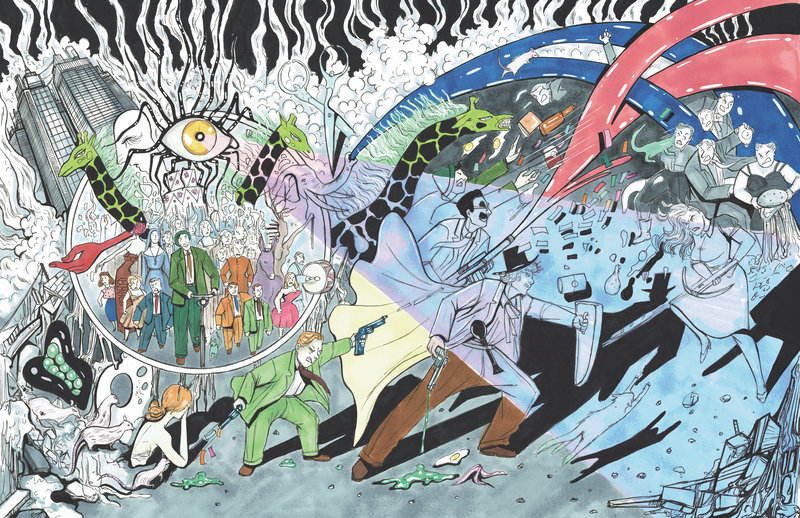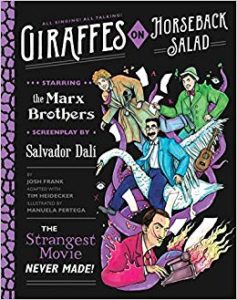Giraffes on Horseback Salad
Josh Frank (writer), Tim Heidecker (writer), Manuela Pertega (artist)
Quirk Books
April 2019
Giraffes on Horseback Salad
Total Time: 224 pages
Ingredients:
1 Surrealist painter
3 Marx Brothers
1 Lobster phone
3 Songs
1 Stout and oyster bath
Directions:
HONK!
And serve.
There’s an old story about the quizzical title of the Marx Brothers’ 1933 comedy classic, Duck Soup, attributed to Groucho: “Take two turkeys, one goose, four cabbages, but no duck, and mix them together. After one taste, you’ll duck soup for the rest of your life.” How can I explain the similarly epicurean title Giraffes on Horseback Salad, the filmed collaboration between the Marx Brothers and surrealist Salvador Dalí that never was? Uh, excuse me while I bolt off-screen in a cloud of cartoon dust.
First, let’s rewind the melting clocks. In late 1930s Paris, comedian Harpo Marx met artist Salvador Dalí, striking up a friendship that would seem unlikely if not for the streak of anarchic absurdity that ran throughout both their works. Dalí devised a film treatment for the Marx Brothers in which Harpo would play Jimmy, a displaced Spanish aristocrat who falls in love with the Surrealist Woman, a being made of pure imagination. Called Giraffes on Horseback Salad and featuring gags like “Harpo appear[ing] naked with a lobster on his head while stroking a monkey,” the film was pitched to MGM and rejected. After all, it was 1937, and how can you film the unfilmable? Giraffes on Horseback Salad lived on in tantalizing fragments, the stuff “15 Greatest Movies NEVER Made!” listicles are made of.
How did this graphic novel wind up in my hands? Enter lifelong Marx Brothers fan and “pop culture archeologist” Josh Frank, who sought to recreate this lost, impossible object from every notebook fragment or Harper’s Bazaar article he could find. Frank also, wisely, sought collaborators who could bring the energy of the Marx Brothers and Dalí into the 21st century. Comedian Tim Heidecker (Tim and Eric Awesome Show, Great Job!, Jordan Peele’s Us) pumps up the story with Groucho-esque one-liners, and Spanish artist Manuela Pertega acts as “cinematographer” and artist, bringing the book to surreal, squirming life. It’s a strange meal, indeed.
Giraffes on Horseback Salad is presented as the 1937 MGM musical it would have been, a black-and-white world inhabited by stuffy businessmen and shallow socialites until Groucho and Chico drive up in the Surrealist Woman’s mile-long green limousine. For Marx Brothers superfans, Giraffes is more akin to A Night at the Opera than Duck Soup, with Groucho and Chico serving as amusing distractions from the central love story, though Jimmy and the Surrealist Woman are far, far more interesting than Alan Jones and Kitty Carlisle. (Just how surreal is this book? Harpo speaks!)
Harpo’s Jimmy is a handsome young creative genius stifled by the rigidity of his colorless world. Then he has a chance encounter with the Surrealist Woman, a glamorous, reality-warping shapeshifter who is less a “dream girl” than an actual walking dream. When Jimmy and the Surrealist Woman’s love begins to literally change the world, “reality” (symbolized by Jimmy’s vulgar fiancée, Linda) fights back, and the war between creativity and conformity has begun. Oh, and Groucho takes some calls on a lobster phone.
The book is a visual feast. Nearly every page has something new to savor, taste, or devour. It must have been a daunting task to make a book with the visual style of one of the most famous painters of the 20th century, but Manuela Pertega was more than up for it. There are traces of Dalí here, homages to his flower-headed women and the 1935 painting Face of Mae West, but mostly Pertega turns the book into a surrealist object of her own. Think panel borders made of ropes of green hair, or waxy, congealing ooze. Or a giant eyeball crawls atop a wedding cake with its own eyelashes as spidery legs. And Jimmy rides a unicorn made entirely of human hands. Pertega’s greatest creation is the Surrealist Woman herself, who never appears in the same form twice, but is always recognizable; even at her most abstract, she’s capable of projecting great love or great sadness.
Script-wise, Frank and Heidecker nail the bang-bang-bang banter of the Marx Brothers, which is no easy feat considering how much of their verbal sparring relies on timing and rhythm that can’t be duplicated in print. (Groucho, lowering his glasses to address a dowager’s fox fur stole: “Say, how’d a hound like you end up on a dog like that?”) If anything, however, it made me want more Marx Brothers, since of the four comedians (yes, the Zeppo Defender has logged on), we essentially only get two, Groucho and Chico. Though Giraffes could also be titled Marx Brothers Origins: Harpo, we see only a few glimpses of Jimmy’s honking, harp-playing alter ego.
Given the creators who inspired it, and the later artists who brought it to life, it’s maybe impossible that Giraffes on Horseback Salad could be anything but a comic chimera, the surreal battling the comedic for dominance on the page. It’s a strange—but fascinating—interlude.


